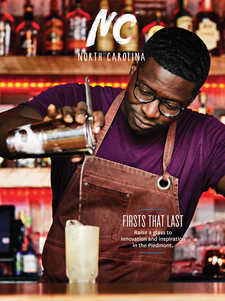Stepping Back in Time: Hearth Cookery and More - An African/American Experience
Posted on 10/30/19Seagrove, NC - On Saturday, November 9th, Westmoore Pottery of the Seagrove, NC area will present “Stepping Back in Time: Hearth Cookery and More.” Guest historical cooks for the day will be Karen Becker of Staunton, Virginia and Jerome Bias of Durham, North Carolina. This year’s focus will be on foodways of Africa and of early African-Americans, a fitting topic since 2019 marks the 400th anniversary of the first enslaved Africans having been brought to this country.
“Our yearly cooking program is consistently the most anticipated and enjoyed of all our events,” says potter Mary Farrell, “and this year’s topic is one that we have not previously explored.”
The cooking will take place from 10 am to 4 pm. Samples will be available of finished foods. “A few people spend the entire day here,” says Mary Farrell, “but most just come and go as they please, sometimes coming back to taste a dish they watched in the process earlier in the day.” Both guest cooks have a love of historical cooking. In talking with Karen and Jerome, visitors will be able to see food connections from Africa to early America and even to today.
Karen Becker spent years working at various museums and living history sites and has researched historical cookery all her adult life. Her food experience ranges from the crops in the fields, to animals raised for food purposes, to the cooking itself. After a brief stint of being retired from and volunteering for Frontier Culture Museum (FCM) in Staunton, Virginia, Karen this year was rehired part-time at FCM. Much of her museum time is now spent on the FCM’s Nigerian Farm.
At “Stepping Back in Time” Karen will demonstrate and talk about the foods and cookery of the African Igbo tribe of Nigeria in the 17th century, at the time the Igbo were first brought to Virginia as enslaved people. “I feel like I’ve been preparing for this research project all my life,” says Karen. “The Nigerian cooking has been by far the hardest to research, mainly because Igbo food knowledge was passed down by oral traditions, as opposed to the written record left by European cooks.” Making research into cookery of the African Igbo tribe even more difficult is that European travelers who might have left travel diaries only rarely ventured beyond the coastline into the interior of West Africa until the 18th and 19th centuries.
At Westmoore Pottery on November 9th Karen will be cooking on an outdoor fire and using pottery brought from Africa. Some of the ingredients she will use are not generally used in this country and have been bought at a specialty African grocery in Virginia, but visitors may be surprised at how many foods we commonly use today were introduced to this country from Africa. Among the African dishes, Karen plans to prepare are two or three different soups or stews, a rice dish, fufu made from yams, Akara (a pea fritter), and several hot pepper sauces. Ever tried goat meat?
Jerome Bias worked at Old Salem before venturing out on his own. He was first a woodworker of historical furniture before becoming interested in foods and cooking methods of the past. These days Jerome often works in tandem with the Slave Dwelling Project (https://slavedwellingproject.org) presenting African-American cooking of the 18th and early 19th centuries during the Slave Dwelling Project events.
Jerome will be cooking on the hearth of the large fireplace inside at Westmoore Pottery and will interpret African-American cooking from around 1840. Some of the dishes he makes would have been cooked only for celebrations, such as the Creamed Apple Pie. (“I love to bake!” says Jerome.) Others would have been more commonly made. Among the dishes, Jerome has planned are sweet potato pone, a rice pie with chicken, eggplant creole, and mixed greens. Jerome will use some of Westmoore Pottery’s replica historical pottery in his cooking.
Indoor displays at Westmoore Pottery will complement the day’s learning experience. In addition, for this one-day event only, Westmoore Pottery will be selling seed packets of fruits and vegetables that came to this country from Africa and will also offer an extended one-day selection of cookery/history/archaeology books, many of which are specific to African and African-American culture.
To add to the day, Mill Creek Forge next door to Westmoore Pottery will also “step back in time” with craftspeople demonstrating blacksmithing, tomahawk and knife making, weaving and spinning by Sandhills Handweavers’ Guild, quilting, outdoor cooking, natural dyeing of wool, soap making, rustic woodworking, and candle making.
Westmoore Pottery’s hearth cookery programs are fun for the general public as well as valued by teachers, historians, cooks, reenactors, and lifetime learners. Both Karen and Jerome are good at answering questions and explaining while they are cooking and enjoy teaching history through food!
Westmoore Pottery is located at 4622 Busbee Road, just off Highway 705 halfway between the small towns of Seagrove and Robbins in North Carolina. Email [email protected] with any questions.






